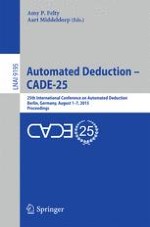2015 | OriginalPaper | Chapter
Automating Leibniz’s Theory of Concepts
Authors : Jesse Alama, Paul E. Oppenheimer, Edward N. Zalta
Published in: Automated Deduction - CADE-25
Publisher: Springer International Publishing
Activate our intelligent search to find suitable subject content or patents.
Select sections of text to find matching patents with Artificial Intelligence. powered by
Select sections of text to find additional relevant content using AI-assisted search. powered by
